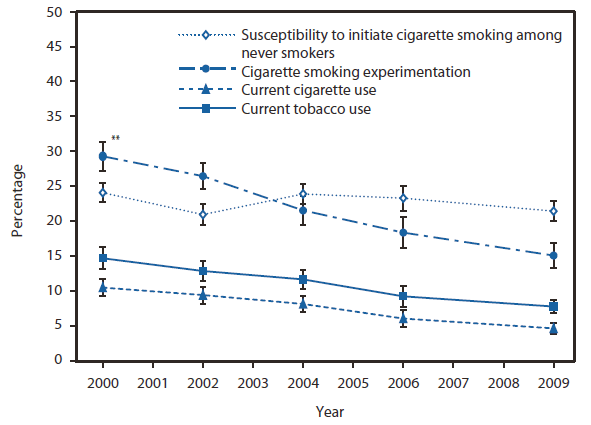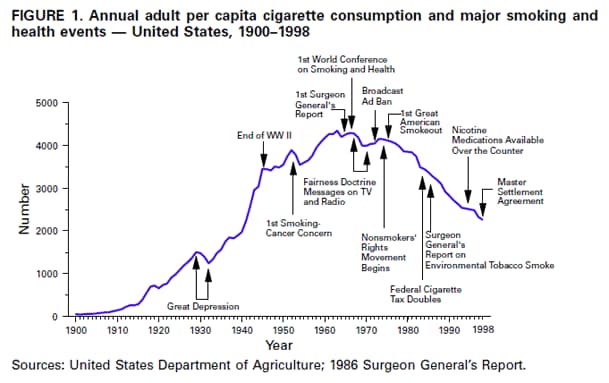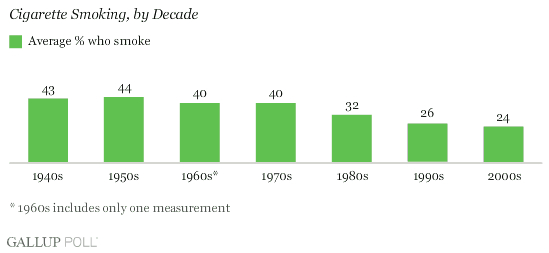Stubby wrote:During World War II, cigarettes were included in American soldier's C-rations since many tobacco companies sent the soldiers cigarettes for free. Cigarette sales reached an all time high at this point, as cigarette companies were not only able to get soldiers addicted to nicotine, but specific brands also found a new loyal group of customers as soldiers who smoked their cigarettes returned from the war.[46]
After World War II, cigarette companies advertised frequently on television programs. To combat this move by the cigarette companies, the Federal Communications Commission required television stations to air anti-smoking advertisements at no cost to the organizations providing such advertisements. In 1970, Congress took their anti-smoking initiative one step further and passed the Public Health Cigarette Smoking Act, banning the advertising of cigarettes on television and radio starting on January 2, 1971.
Love the sarcasm. Comparing tobacco use to illegal drugs...
Your implied premise that since the rise of tobacco use is not due to prohibition, therefore prohibition does not increase consumption in other drugs is funny. Unless you have proof that the usages of other drugs follows a similar pattern?
I do have such proof. Here it is. This is the normal progression of legal drugs.
Chests of Opium imported into China.

Here's another chart.

And a quote: (
From one of MSimon's favorite sources. The Drug Library.)
Then, in 1906, the incredible happened. After over a hundred years of steady demoralization, with half her population opium addicts, or worse still, making enormous profits out of the trade, China determined to give up opium.
Stubby wrote:
The fastest rate of consumption increase occurred during WWII when your service people where provided a free addictive drug with no apparent negative side effects except coughing which disappeared over time. Its use increased in the 50s and 60s through the power of advertising as well as through second hand smoking in smokers homes.
Obviously if dope were legal, we wouldn't have pushers, like we do now.

Stubby wrote:
The ban on advertising resulted in the beginning of the decline of use. I personally enjoy the ban in public buildings and aircraft as I am no longer forced to smoke against my will. I wonder how many people that this measure has saved from addiction?
Do you mean Societal disapproval affects behavior? Whodathunk? What is the ultimate expression of Societal disapproval?
Stubby wrote:
I have not seen where you have proved that the evolution of tobacco use is in anyway related to uses of other drugs?
From my perspective, the relationship is self evident, and hardly needing of any proof.
Stubby wrote:
No other drugs were handed out free or lobbied as hard or advertised as hard as tobacco.
You really haven't met any pushers have you? I have a friend who was a former pimp/pusher (now a successfully employed man with a house, a truck, a Wife, and a New Child, which I somewhat credit to my influence upon him.) who used to roam up and down the streets looking for young girls to snag. He talks them into hitting some weed, then he gets them to try crack. In a week he has them felating strangers to feed their habit.
He said "with his crack, he could get her crack." Don't worry about people lobbying hard for drug usage. You make the stuff legal, and you will see an avalanche of people lobbying for it's usage.
Stubby wrote:
Now if tobacco ever gets truly banned, then we will see if the theory is true. However I do not see this ever happening and nor should it.
Tobacco is slowly being banned by attrition. If the pressure is kept up, usage of it will slowly continue to decline. I suspect those responsible for this pressure will ease off before it is completely eradicated because currently there are too many people who want a piece of the action, up to and including the State Governments who receive the tobacco taxes.
I believe that tobacco could (in theory) be eradicated, or at least brought down to a very low level of usage, if slow but continuous pressure is applied. Simon's argument that "prohibition" is futile is contrary to the evidence demonstrated by tobacco's slow decline.

‘What all the wise men promised has not happened, and what all the damned fools said would happen has come to pass.’
— Lord Melbourne —






